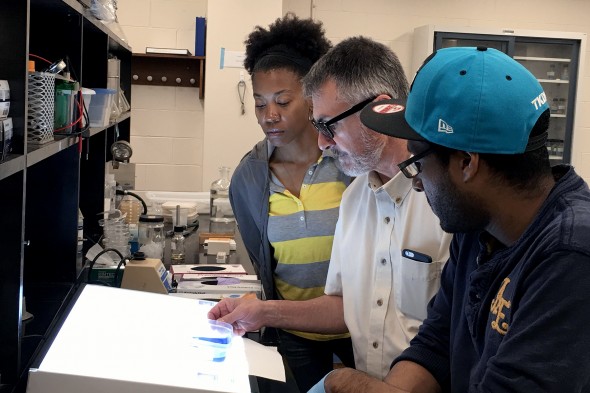East Meets West: Bridges to baccalaureate

Ron Dubreuil, associate professor of biological sciences, mentors community college students through the UIC Bridges to Baccalaureate Program.
A program at UIC is guiding students from community colleges to the finish line by putting their interests under a microscope and highlighting the importance of diversifying teams.
Funded by a $1.4 million grant from the National Institutes of Health, the Bridges to Baccalaureate Program recruits qualified underrepresented students from the City Colleges of Chicago and South Suburban College. Selected students are bridged into one of three baccalaureate tracks — nursing, public health or liberal arts and sciences — toward a degree at UIC. The competitive experience introduces students to careers in science research, diversifies the workforce of health-related fields and bolsters degree completion.
“The unique feature of this grant is that it brings together behavioral and biomedical sciences, exposing students to a really broad array of different topics that they might not otherwise see,” said Ron Dubreuil, associate professor of biological sciences and the grant’s co-investigator.
Students spend two weeks learning the fundamentals of research through lectures and lab experience across campus. Participants are then matched with faculty mentors and peer tutors from many campus departments — including psychology, physics, biological sciences, chemistry, dentistry, pharmacy, medicine, nursing, community health sciences and public health — who volunteer to work with participants on research projects. The 35-hour commitment lasts six weeks and engages students in tasks such as data collection, data analysis and literature reviews.
“Our faculty are so deeply committed to these students that they volunteer [to be mentors],” said principal investigator Paula Allen-Meares, chancellor emerita and professor in the separtment of medicine. “It’s really a wonderful commentary about UIC faculty and their willingness to support and give back to students.”
Michael Ndichuck, a member of this year’s cohort and a first-generation college student, plans to transfer to UIC next year from Harry S. Truman College.
“During our two weeks of training, these amazing doctors came in and told us what the field of research looks like in the real world,” he said. “My mind was blown.”
Participant John Hayes worked with Phoenix Matthews, professor of health systems science in the College of Nursing. Matthew’s research examines cancer prevention and control in underserved populations, such as the African American and LGBTQ communities.
“Before the Bridges program, I never had an interest in research, and certainly not in research writing,” said Hayes, a 2014–15 participant. “I thought I wanted to be a nurse practitioner, and, afterward, that kind of shifted.”
Hayes transferred from Malcolm X College after completing Bridges and is interested in applying to graduate programs in public health policy and administration after he graduates from UIC in December.
“Finding out what you want to do can take a long time,” said Hayes, who joined the U.S. Army after high school and served for 18 years before deciding to go back to school.
“But finding someone who has more experience to just guide you, give you direction and kind of nurture you along the way, that makes a difference — when you find people that care and that want you to succeed.”
Encouragement from college faculty also guided Oluwadamilola (Dharmmie) Bankole, a Nigerian immigrant, from community college to the Bridges program, where she joined a research group that allowed her to co-author and publish a paper. After graduating from UIC in May with a degree in biochemistry, she’s now a postbaccalaureate fellow at the National Institutes of Health.
“She joined the community, she participated, she enriched our lives with her personality, and I feel a sense of pride in her accomplishments,” said Brian Kay, investigator emeritus and one of Bankole’s mentors.
“We opened her eyes to opportunities and she was able to pick the things that were of interest to her. So she did all of the hard work, I think we just opened doors for her.”
And student participation in research benefits professors, too.
“Many of the patient populations in studies would represent diverse socioeconomic groups, so the patient base for which you would try to apply basic science discoveries is diverse, and with representatives of these groups, it helps to facilitate the transfer of that knowledge,” Kay said.
“I learn something new every single day from the students who work with me in the lab,” added Matthews. “Whether I work with international students, or students with an emphasis in public health, psychology or nursing, I learn a lot of cross-disciplinary theories and research methods. It’s really refreshing and pushes me to grow every day.”
This year’s cohort was made up of 13 undergraduates. All participants presented their research Aug. 17 in a Summer Research Colloquium. Research abstracts will be sent to the Annual Biomedical Research Conference for Minority Students, one of the largest conferences for underrepresented students and students with disabilities to pursue training in STEM-related fields.
The presentation day also highlighted the grant’s second focus: to improve science education at community colleges. Community college partner faculty presented summer projects, designed by associate professors at UIC, to enhance their expertise in science research.
“UIC is deeply committed to developing all persons, to developing talent and leveraging the capacity of different individuals who comprise our society,” Allen-Meares said. “It’s part of the vision that we had and we continue to have for the university: to promote student success and to prepare the next generation of scientists, doctors, nurses and public health experts.”
